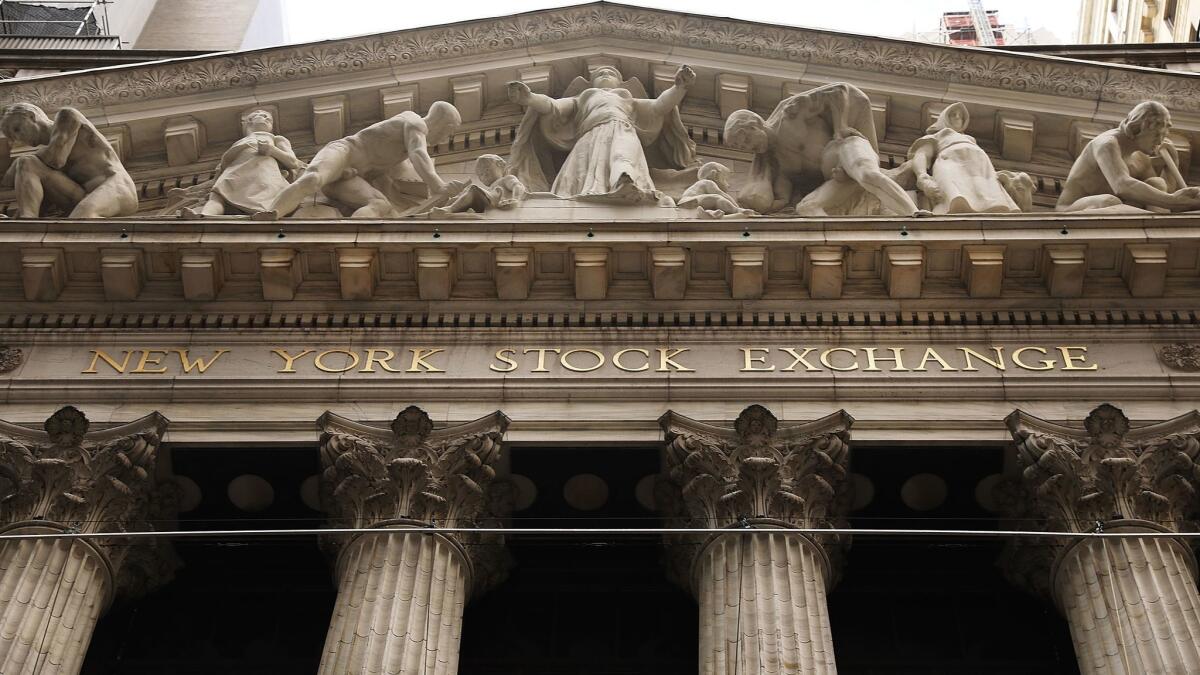Stocks have worst week since 2011 amid fears of a slowdown

- Share via
After almost 10 years, Wall Street’s rally looks like it’s ending. Another day of big losses Friday left the U.S. market with its worst week in more than seven years. All of the major indexes have lost 16% to 26% from their highs this summer and fall.
Barring huge gains during the upcoming holiday period, this will be the worst December for stocks since 1931.
After a sharp early gain Friday, the S&P 500 index retreated 50.84 points, or 2.1%, to 2,416.58. The S&P 500, the benchmark for many index funds, has fallen 17.5% from its high in September. The Dow Jones Industrial Average sank 414.23 points, or 1.8%, to 22,445.37.
The tech-heavy Nasdaq skidded 195.41 points, or 3%, to 6,332.99. It is now down almost 22% from its summer highs, sending it into a bear market. The Russell 2000 index of smaller-company stocks lost 33.92 points, or 2.6%, to 1,292.09.
There hasn’t been one major shock that has sent stocks plunging. Investors fear a recession is coming and are finding more and more reasons to worry. The U.S. has been locked in a trade dispute with China for nine months. Economies in Europe and China are slowing. And rising interest rates in the U.S. could slow its economy too.
Stocks are now headed for their single worst month since October 2008, when the market was being battered by the global financial crisis. The major U.S. indexes fell 7% this week and they’ve sunk more than 12% in December.
December is generally the strongest time of the year for U.S. stocks. Traders often talk about a “Santa rally” that adds to the year’s gains as people adjust their portfolios in anticipation of the year to come. But not this year.
No sector of the market has been spared. Large multinational companies join smaller domestic ones in their losses. And huge high-tech companies, once the best-performing stocks on the market, are now leading the way lower.
Technology’s huge popularity during the recent boom years made it even more vulnerable as investors’ moods turn sour. Amazon, Facebook, Apple, Netflix, and Google’s parent company, Alphabet, have seen their market values fall by hundreds of billions of dollars.
Several big technology companies, notably Facebook and Twitter, have suffered as a result of scandals over matters such as data privacy and election meddling, and traders worry that the industry will face greater government regulation that could increase costs and affect their profits.
“If you live by momentum, you die by momentum,” said Sam Stovall, chief investment strategist for CFRA.
The price of oil has also fallen sharply in recent weeks, down 40% from the high it reached in October, amid concerns over a glut in the market and the slowing economy. On Friday, the price of U.S. crude slipped 0.6% to $45.59 a barrel in New York. Brent crude, the standard for international oil prices, fell 1% to $53.82 a barrel in London.
Bond prices were mixed. The yield on the 2-year Treasury note fell to 2.62% from 2.65%. The yield on the 10-year Treasury note dipped to 2.78% from 2.79%.
Gold lost 0.8% to $1,258.10 an ounce and silver fell 1.1% to $14.70 an ounce. The U.S. dollar ticked higher after two days of sharp losses brought on by fears about the economy and slower increases in interest rates. The dollar rose to 111.36 yen from 111.11 yen. The euro fell back to $1.1369 from $1.1469 and the British pound slipped to $1.2639 from $1.2671.
More to Read
Inside the business of entertainment
The Wide Shot brings you news, analysis and insights on everything from streaming wars to production — and what it all means for the future.
You may occasionally receive promotional content from the Los Angeles Times.










